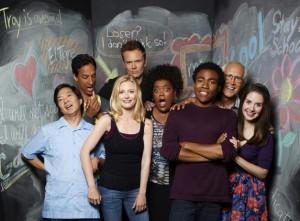
The example set by the characters in “Community” may set unrealistic expectations about how relationships are formed.
“Community” is not only a great show title, but also perfectly sums up the TV show’s Greendale Community College’s Spanish class study group.
The show follows a group of students who hail from a multiplicity of races and age groups as they meet to study for a Spanish class they are all enrolled in. Adventures abound as they morph into a friendship group that not only studies, but also “gets talks” together.
As with all group relations, while there are ups and downs, happy and sad times, romantic episodes and trying rifts, they nevertheless stick together. The creators have done a wonderful job of making a comedy that has a sentimental undertone to it, so that the final result is a very charming, yet insightful show.
Some in the group became closer to certain members, more so than others, yet there was a unity that flowed throughout that all originated from the study group. In fact, every title sequence at the beginning of the show happens to take place on the table in the community center where the group met for Spanish. The study group had unintentionally been the catalyst for all the relationships formed in the show.
Yet my classroom experiences, including breakoff study groups like that shown in the show, do not exemplify “Community” in the slightest. In lecture halls, I am too busy typing up notes or trying to understand what the professor is actually saying to build connections with those around me. It doesn’t help that those lectures tend to take place when all you want to be doing is sleeping.
Some might say that it is just due to the size of the class that such experiences occur. I would argue just the opposite. In the smaller classes and discussion sections there is even less of a communal feel than in the large lectures. Obligation is the reason we are all there. An 8 p.m. mandatory discussion on a Thursday doesn’t exactly put one in the mood to make friends.
Part of the reason I believe it is this way is because everyone knows that in this system the class is a finite experience, destined only to last one semester, and it is hard to build a relationship within such a limited time frame. As students, we would much rather form relationships in environments where the frequency and duration of the interaction is controlled by us, like in school clubs and at parties.
Granted, whenever comparing film to real life experiences, one must acknowledge the unrealistic nature of the TV show or movie situations. The chances of having a group comprised of both men and women who are from a variety of racial backgrounds, that happen to come from different economic backgrounds and age ranges all in the same classroom, are slim to none. To have them get along as well as they did in the show is virtually impossible.
Yet so many of us watch week after week, episode after episode, because it epitomizes what we love about Hollywood. They give us the relationships and adventures that we might not be able to have in our lifetimes.
As for the relationships that I have both formed and seen formed by other students, they can certainly be sparked in the classroom and possibly even sustained without hanging out outside of class. However, a community of five to six forming in a class that has adventures every week together? No. Not a chance.
This is not meant to be negative outlook on how our relationships are formed at Georgetown. Rather, I look at this as a testament to Georgetown’s system of education balanced with other aspects of college life. Focusing in the classroom and having fun outside of it, not only leads to good grades, but also a great college experience. So for final advice, follow the rule that binds the Georgetown community, and “work hard, play hard.”
Justin Kotwicki is a rising sophomore in the College. Getting Talks appears every other Wednesday at thehoya.com.













